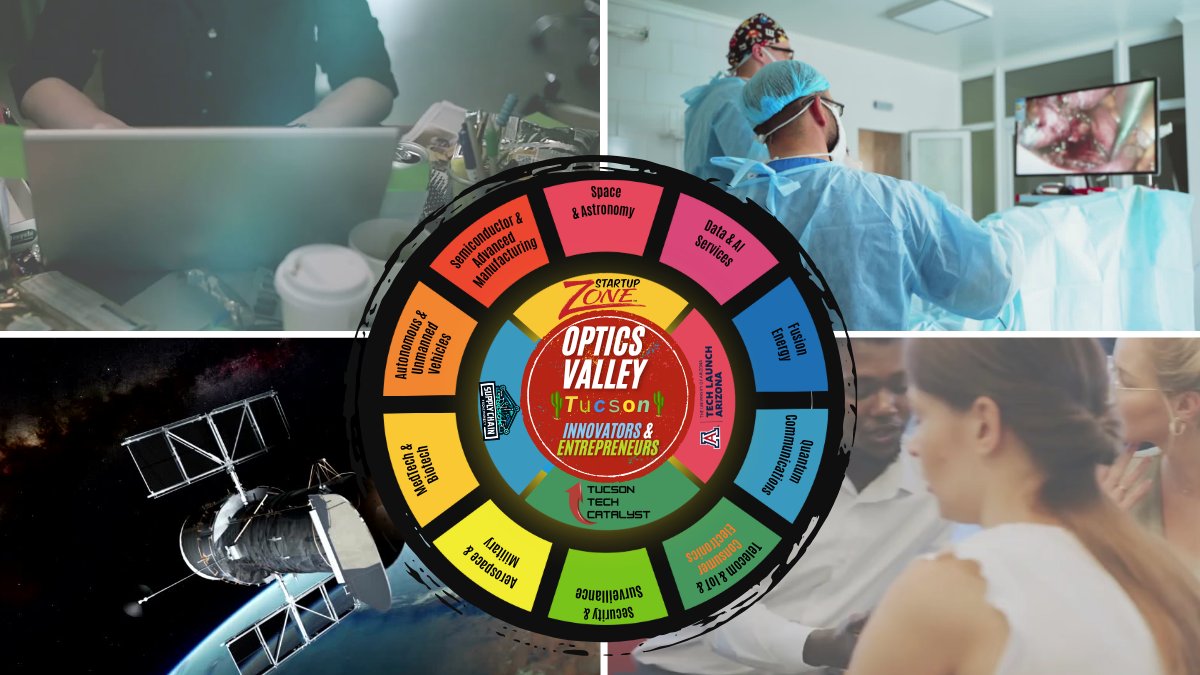Tech Hub and Its Ecosystem
How Startup Zones Builds Community by Connecting Innovators, Talent, and Supply Chains
Every startup ecosystem has one thing in common: people. Entrepreneurs, university researchers, students, investors, mentors, and manufacturers bring unique value. But too often, they operate in separate worlds. Universities focus on research. Entrepreneurs fight to get their companies off the ground. Supply chains work quietly in the background. And talent, especially young graduates, struggle to see where they fit.
Startup Zones was created to bridge those gaps using the combined models of other, more advanced startup ecosystems. Its mission is simple: build community by listening to entrepreneurs and connecting them to the resources, people, and opportunities they need most.
Instead of forcing startups into a pace, and rigor, or more advanced startup hubs, Startup Zones begins with active listening. Entrepreneurs in nascent ecosystems, such as Tucson, share their needs, challenges, and visions. From there, Startup Zones helps make programming, events, and connections that matter and fit the local needs: linking a university researcher with an industry partner, introducing a founder to a supply-chain expert, or matching students with startups that need help.
Why Community Matters
Building a startup is a lonely journey. Founders often feel like they need to do everything on their own. They’re carrying the world’s weight while navigating questions they’ve never faced before. Should they protect their technology with a patent? How do they find the right cofounder? Which customers should they target first, and what problems are they solving for?
Community doesn’t solve those problems overnight, but it gives entrepreneurs something priceless: a support system. Startup Zones fosters that by creating spaces where entrepreneurs feel heard, valued, and supported.
This isn’t just about networking events or pitch competitions. It’s about long-term relationships where founders know they can come back, ask new questions, and get honest feedback from people who want them to succeed.
Listening First
What makes Startup Zones different is its commitment to listening. Too often, ecosystem builders create programs that look good on paper but don’t match what entrepreneurs need. Startup Zones flips that script.
Every program, event, or connection starts with one question: What do you need?
For one entrepreneur, the answer might be access to mentors who understand fundraising, but they need more customer discovery. In addition, it might help navigate university licensing agreements. For a third, it could be finding a manufacturer who can produce a prototype at scale.
By asking and then acting, Startup Zones builds trust. And when entrepreneurs feel heard, they’re more likely to leave their home, lab, or office to engage, share openly, and support others in the community.
Tapping into Tech Talent
A strong ecosystem also depends on talent. Students and early-career professionals often want to be part of something exciting, but they don’t always know how to get involved with startups.
Startup Zones opens that door by linking talent with founders who need help. That could mean internships, contract work, or even cofounder opportunities. For students, it’s a chance to apply their skills in a real-world setting instead of just a classroom. For startups, access to energy, fresh ideas, and technical know-how can make all the difference.
And because Startup Zones emphasizes listening, these opportunities are shaped around what both sides need. Some founders may need coding help for a prototype. Others may need someone to manage social media or dive into market research. By matching needs with talent, Startup Zones ensures the work is meaningful and impactful for everyone involved.
Like founders, tech talent must understand the value of community and netweaving. By doing so, they are learning new skills, but more importantly, they develop a new mindset that enhances their ability to solve problems for the right people at the right time.
Building a Culture of Collaboration
At its heart, Startup Zones isn’t just about programs or metrics. It’s about culture. A culture where entrepreneurs know they’re not alone. A culture where universities, talent, and supply chains aren’t silos but active partners. A culture where giving first offering help before asking for it becomes the norm.
This culture doesn’t happen overnight. It’s built through consistent action: showing up, making introductions, active listening, and celebrating wins. Over time, that culture compounds. Founders who once needed help become mentors. Students who took internships become cofounders. Supply chains that supported prototypes evolve into global partners.
Connecting Universities and Tech Transfer
Universities are treasure troves of innovation. Labs across the country are filled with cutting-edge discoveries in optics, biotech, AI, renewable energy, and beyond. But turning those discoveries into products that change the world requires a bridge. That’s where tech transfer comes in.
Startup Zones works closely with tech transfer offices, helping researchers take their ideas from “interesting paper” to “viable startup.” Many innovators don’t know where to start with business basics. They might have brilliant inventions, but a limited understanding of markets, customers, or fundraising.
By building trust and simplifying the process, Startup Zones helps these researchers connect with entrepreneurs who can commercialize their work and mentors and investors who understand the journey. The result? More innovations leave the lab and make it into the hands of people who need them. This can be especially powerful when university IP can be used to strengthen and defend a startup’s solution to market. It can also enhance its attractiveness to institutional investors.
Strengthening Supply Chains
Behind every great tech company is a supply chain. Hardware startups need precision machining. Software companies need secure servers and integration partners. Even digital-first companies need reliable vendors for marketing, design, or logistics. There is nothing better than having these partners locally. This reduces cost, time to market, and growth in the local tech hub.
Yet many entrepreneurs don’t know where to find the right partners or assume that global suppliers are the only option. Startup Zones highlights the value of local and regional supply chains, introducing founders to manufacturers and service providers ready to support innovation.
This does more than help startups grow. It strengthens the entire economic fabric of the region by giving supply-chain companies new opportunities to work with emerging technologies. Over time, these relationships create a cycle: startups grow with strong supply chains, and supply chains evolve by working with innovative startups.
The Road Ahead
Startup Zones is still growing while challenging the status quo, but its vision is clear: a connected, collaborative ecosystem where innovation thrives because people support each other.
By focusing on community, listening to entrepreneurs, and connecting universities, talent, and supply chains, Startup Zones is proving that the future of innovation isn’t just about big ideas. It’s about the people and partnerships that bring those ideas to life.
And when people come together with trust, curiosity, and generosity, they don’t just build startups. They build communities that last.
These methods are not for Tucson (Optics Valley) alone but for every nascent and rural ecosystem around us. Reach out to us if you are inspired and need help.








